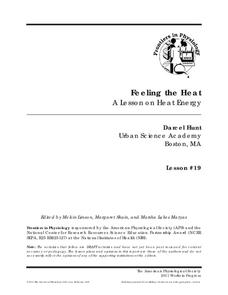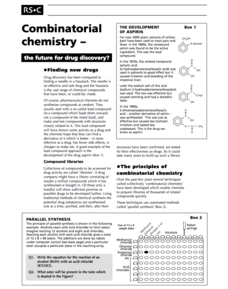Curated OER
4-H Advanced Food Science Activity Pages
In this 4-H food science worksheet, learners examine how food works in the body, find out about food preservation methods, and investigate careers in the food industry. They complete a word search, practice food photography, answer true...
Curated OER
4-H Food Science- Advanced Activity
In this advanced activity food science worksheet sets, middle schoolers complete a food find word search puzzle, and practice food photography as they investigate it as a career. They examine food preservation methods through a food...
American Physiological Society
How Does the Density of a Liquid Affect the Buoyancy of an Object?
Here's a lesson plan that will really float your boat! Introduce physical science scholars to the relationship between buoyancy and density through an assortment of individual and collaborative exercises. Lab groups work together to...
American Physiological Society
Sticky Adaptations A Lesson on Natural Selection
Now you see it, now you don't! The stick bug exhibits the ability to disappear into a wooded environment. Why does this adaptation manifest in some species, but not in others? Life science students explore animal adaptations in nature...
American Physiological Society
Hoo Eats Who and What is What in Your Own Backyard?
Bird is the word! Teach life science scholars the importance of our feathered friends and the roles they play in our ecosystem. Using the plan, learners investigate the birds in their areas, determine the biotic and abiotic factors that...
Curated OER
4-h Veterinary Science Activity Page
The 4-H teaches students about agriculture, health, and animal care - the last of which is the focus of this activity. From dogs and cats to pigs and hedgehogs, this worksheet provides helpful tips for caring for animals, as well as...
Curated OER
4-H Veterinary Science Activity Page- Life Skill
In this veterinary science activity page activity, students focus on the life skills associated with ethical decision making. They describe their favorite pet animal, how to care for their pet based on its needs, complete 14 true or...
Achieve
False Positives
The test may say you have cancer, but sometimes the test is wrong. The provided task asks learners to analyze cancer statistics for a fictitious town. Given the rate of false positives, they interpret the meaning of this value in the...
American Physiological Society
It’s the Heart of the Matter
Get the class jumping for joy with a fascinating look at matters of the heart. Learners perform physical tasks, collect and analyze heart rate data, and study conditions that affect heart health. Use the action-packed lesson plan to...
American Physiological Society
Feeling the Heat
How do the changing seasons affect the homes where we live? This question is at the forefront of engineering and design projects. Challenge your physical science class to step into the role of an architect to build a model home capable...
American Physiological Society
Thermal Insulators: Keep it Hot!
There's nothing like a cup of hot chocolate on a chilly winter's day. Except for when that hot chocolate quickly becomes lukewarm chocolate ... or even cold chocolate. What material provides the best insulation to keep the chocolate from...
Royal Society of Chemistry
Chemistry Masterclass—Chemistry Outreach
Immerse your chemistry class in the world of organic chemistry! Science scholars isolate acetaminophen from an over-the-counter sample during an intense and interesting lab. Groups use many different separation and analysis techniques to...
American Physiological Society
Drug the Water Flea
This is a flea. This is a flea on drugs. Any questions? Your class will have questions aplenty during an impactful experiment. Lab groups get to know Daphnia magna, the humble water flea, and study the effects of stimulants and...
American Physiological Society
An Inquiry into Alcoholic Fermentation
Introduce life science students to their new "best buds" yeast! Using a wide variety of materials, lab groups design an experiment that illustrates how yeast acquires the resources it needs to undergo cellular respiration. The teacher's...
American Physiological Society
Did I Observe it or Infer it?
Take the mystery out of inquiry! When young scientists learn to use their keen powers of observation to make smart inferences about a situation, they are well on their way to understanding what the scientific method is all about. Using...
American Physiological Society
Why is Kettle Corn Cooked in Copper Pots?
The kitchen — it's not just for eating anymore! Specific heat is often a difficult concept to grasp, so give it context by relating it to cooking. Learners gain experience in the principles of thermal energy transfer by designing an...
American Physiological Society
Sit On It
How do product designers come up with the variety of things we see in stores and on TV every day? They identify a need, then create something that meets that need. Sounds simple, right? A two-week lesson puts seventh graders in that role...
Royal Society of Chemistry
Combinatorial Chemistry—Chemistry Now
Finding new drugs has been likened to finding a needle in a haystack. How do pharmaceutical companies do it? One of a small series of four informative leaflets examines combinatorial chemistry, the method at the forefront of new drug...
Curated OER
How Many Hats Does a Farmer Wear
In this farmer worksheet, learners make a spinning wheel to describe the jobs of a farmer. Students create 1 wheel with 8 different jobs for a farmer.
American Physiological Society
Effects of Environment on Enzymes
Much like the tale of Humpty Dumpty, proteins, once altered, will never be the same again. Honors and pre-AP biology classes explore the delicate world of enzymes via a Webquest and lab experiment. The teacher's guide contains all...
American Physiological Society
What Environmental Conditions Lead to the Hatching of Brine Shrimp?
Will changing the environment in which brine shrimp live impact their reproductive success? Young scientists get hands-on experience studying the habitat of brine shrimp in a two-week immersion instructional activity. The teacher's guide...
Curated OER
What's an Ecotect?
In this future jobs worksheet, students use their creative thinking to select 10 job titles from a list and write a description for each job title. Students discuss as a class what good descriptions are and they discuss life in the future.
Curated OER
Growing
Growing is part of being a living thing. Kindergartners decide which illustrations represent the life cycle of a living thing, then put a check mark next to the correct pictures. They then examine their own growth on a height chart.
Curated OER
Non-living Things
Very young scientists circle the things on the instructional activity that they think are living things. Most of the pictures are of non-living things. A handy instructional activity to use during any initial discussion about living vs....

























